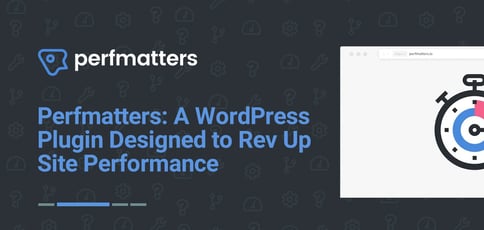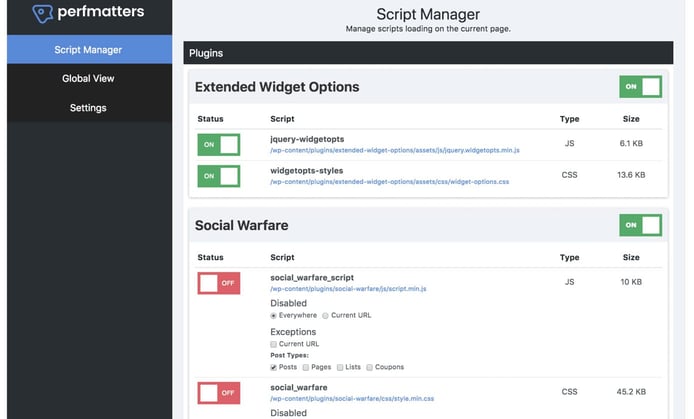
TL; DR: Perfmatters is a lightweight plugin for WordPress created by self-professed performance geeks to speed up websites. The tool, which can help boost SEO and conversion rates, was designed for code efficiency, comprehensive critical features, and an ad-free experience. The Perfmatters team is continuously focused on improving its Script Manager, offering a slew of new performance optimizations to enhance WordPress.
From compelling copy to intuitive design, website owners have to pay careful attention to how various aspects of their sites affect user experience. But if there’s one detail they can’t afford to overlook, it’s overall performance.
Web traffic, user engagement, and even conversions are directly tied to web performance, whether you’re running a blog or an ecommerce business. And now, as Google continues to prioritize clean, unbulky code in search engine rankings, it’s more important than ever to turn to lightweight performance solutions.
Enter Perfmatters. The plugin, known for its low resource consumption, cuts code bloat and boosts performance on WordPress websites — which make up nearly 40% of sites on the internet.

Brian Jackson, Co-Founder of forgemedia LLC, gave us the scoop on how the Perfmatters plugin boosts WordPress performance.
“Perfmatters is a lightweight performance plugin built to take your sites further, even if you already have a caching solution like WP Rocket installed,” said Brian Jackson, Co-Founder of forgemedia LLC, the parent company of Perfmatters. “Our goal is to help customers squeeze every last ounce of performance out of their sites, whether that’s a 5% or 10% increase.”
Designed to work alongside caching plugins, Perfmatters is easy to use, featuring a user-friendly interface and one-click toggle options. It helps increase site performance by reducing HTTP requests, disabling plugins, optimizing databases, and stripping out code.
With a continuous pipeline of updates, new features, and added Script Manager functionality, Perfmatters is devoted to facilitating better user experiences, higher conversion rates, and improved SEO for clients worldwide.
Performance Optimization Tools Created by Two Brothers
Brian and his brother, Brett Jackson, used their cumulative WordPress experience to build the Perfmatters plugin under their parent company, forgemedia LLC.
“We had founded forgemedia and started developing Perfmatters as a hobby while I was working as CMO at Kinsta. “We were frustrated with free performance plugins that always seemed to be missing key features and caused the same kinds of problems. So we decided to build an alternative.”
In developing Perfmatters, Brian and Brett combined best-practice performance optimization tools they had successfully used in the past. From Brian’s experience at Kinsta, the pair knew that many managed hosting providers handle caching at the server level. Therefore, the main goal was to create a lightweight plugin to take performance even further.

The plugin is designed with Google-friendly code.
“The first big thing that we put in our plugin was the Script Manager, which remains our most powerful feature even today, and the one we spend most of our time on,” Brian said. “It basically lets you go to any page on your website and disable, or de-queue, unnecessary scripts that are loading.”
Brian explained that many plugin developers include redundant files on every page of a website to make it easier from a support perspective.
“It’s convenient for them, but performance-wise, it’s not always the greatest strategy,” he said. “For example, you might have a contact form script loading on your whole site when it should just be on your contact page.”
Since adding page weight where it shouldn’t be is counterproductive, the Perfmatters plugin allows users to identify and disable redundant scripts.
“You can say, ‘I have these two scripts loading from my contact form plugins, let me click ‘disable, everywhere,’ except for on my contact page,’” Brian said. “Or we can go even deeper with certain post types and other parameters.”
A Lightweight Plugin Free of Code Bloat
Brian and Brett developed the Perfmatters plugin with the user in mind. The simple solution reduces both the overall number of HTTP requests and the page size by enabling and disabling scripts. And it does so without forcing the user to navigate code.
Perfmatters also includes helpful database optimization features built to impact site performance. The tool helps clean up and limit auto-drafts, revisions, spam comments, and transient records, all of which can fill up and slow down a database.
Brian said that such performance updates are critical in light of Google’s recent announcement that core web vitals will become ranking signals in May 2021.
“Performance scores used to be based on page-load thresholds, but now, they’re not dealing with load times at all,” Brian said. “PageSpeed Insights is calculating performance scores using elements like how fast the Document Object Model (DOM) and code are loading, how long it takes for the first paint of a page.”

The star of the show is the Script Manager, designed to stop redundant scripts from running.
With Google prioritizing these factors, Brian said siteowners should be wary of heavy website builders and plugins that can bring performance to a crawl. In addition to using well-coded, lightweight performance plugins like Perfmatters to optimize your database and disable unnecessary scripts, the forgemedia team recommends customers follow several performance guidelines.
The best practices include investing in managed WordPress hosting, image compression tools, content delivery networks (CDNs), and fast WordPress themes. Other tips include using web fonts sparingly, running web performance audits, and enabling lazy loading (Perfmatters offers four lazy loading options, which delay image loading until a user scrolls down the page).
“Many people are in a tricky place in terms of performance optimization right now, because you have these huge page builders and then Google is pressing down more than ever on code optimization,” Brian said. “So it’s a good time to be focusing on best practices.”
Continuously Evolving the Perfmatters Script Manager
Brian told us that he and his brother recently left their day jobs to focus entirely on Perfmatters and their other plugins. The pair couldn’t have predicted the oncoming pandemic, but the risk paid off anyway. From their experiences at growing startups, Brian and Brett said they both want to focus on staying small and forming relationships with clients, rather than scaling at all costs.
“We both agree that we want to spend time on tickets, helping people — that’s something we really enjoy, even if it’s not a big money-maker,” he said.
In the meantime, the company will focus on continuously evolving the Script Manager and Perfmatters as a whole. For example, with Version 1.6.5, released December 4, the team added a new option to delay JavaScript from loading until triggered by user interaction.
“We just released a way to delay JavaScript until someone moves the mouse on a page,” Brian said. “That’s a big deal because you can apply it to things like Facebook Pixels or Google AdSense — which can bog down people’s pages.”
The company is always working to prepare customers for May 2021, when Google will begin including core web vitals as ranking signals in its algorithm. The team is also working on a complete rebuild and UI overhaul for the Script Manager to make it easier and more efficient to use.
“We’re trying to stay ahead of that so that people aren’t scrambling,” he said. “I have nothing against page builders, but people running especially bulky ones are going to be in a world of hurt without making changes. Even with a plugin like ours, we can only help optimize the code so much — at some point, you have to fix the foundational issues.”
HostingAdvice.com is a free online resource that offers valuable content and comparison services to users. To keep this resource 100% free, we receive compensation from many of the offers listed on the site. Along with key review factors, this compensation may impact how and where products appear across the site (including, for example, the order in which they appear). HostingAdvice.com does not include the entire universe of available offers. Editorial opinions expressed on the site are strictly our own and are not provided, endorsed, or approved by advertisers.
Our site is committed to publishing independent, accurate content guided by strict editorial guidelines. Before articles and reviews are published on our site, they undergo a thorough review process performed by a team of independent editors and subject-matter experts to ensure the content’s accuracy, timeliness, and impartiality. Our editorial team is separate and independent of our site’s advertisers, and the opinions they express on our site are their own. To read more about our team members and their editorial backgrounds, please visit our site’s About page.

